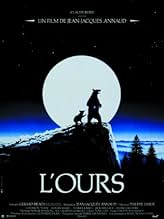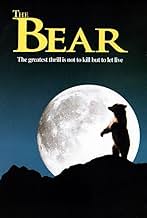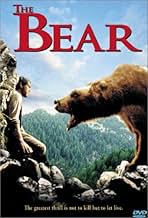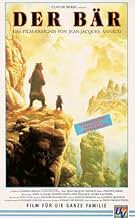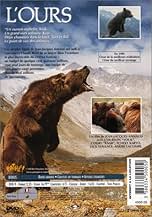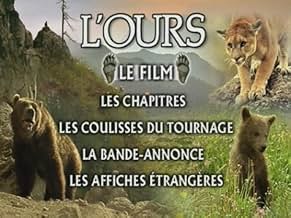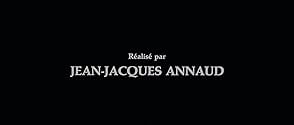- Nominated for 1 Oscar
- 5 wins & 11 nominations total
- Director
- Writers
- All cast & crew
- Production, box office & more at IMDbPro
Featured reviews
The Bear was an art film veiled in the guise of a nature film. I never looked at the roving vistas and sharp cinematography, because when I first watched this, I was more concerned with the bear cub. This is certainly a minimalist film, but the execution was so well done, the power of the images speaks more than the occasional piece of dialogue that is spoken throughout the movie. While it can never be described as kids movie, I think kids might be interested in it due to the very National Geographic-like quality of the film (only without the voice overs). While it has been a long time since I last watched this film (about four years ago), the interesting imagery and the simple, yet meaningful story of survival will always stick with me.
I have this on video but have not watched it for quite some time, the other night I watched it again and was of course entranced. The director has captured perfectly the life of the cub. If I have one gripe it is the use of a "human" voice for the emotions of the cub, in many scenes it is fairly obvious that it is a human being trying to express the emotions of the cub at the time. Secondly, while I understand the storyline of the hunters being integral to the film to be honest I felt that every scene with humans involved was boring beyond belief and I couldn't wait for it to be over. Overall this movie is a sheer joy to behold and the final scene where the cub finally goes to sleep without nightmares is pure bliss. You have to live with animals and know animals to realize how impressive this movie is and I firmly believe that the director has captured pure magic on film. Don't miss it.
Almost 20 years later, this remains the best of "animal" movies I've ever seen - where there is little dialog and animals dominate the screen. The amazing photography with the bears, the stunning cinematography overall and the great landscape (British Columbia) all make this a visual treat. Even better, it's an interesting story and has remained that with each of the viewings I've had of this film since discovering it in the mid '90s.
It's a solid adventure story, and the little bear in here is lovable. The "bad guys" (the hunters) aren't really all that bad, either. The bears' performances are fascinating, simply amazing. It must have taken incredible patience to film this movie.
Outside of a couple of "damns," there is no profanity and, I would think, is a great film for any age person to see. Highly recommended.
It's a solid adventure story, and the little bear in here is lovable. The "bad guys" (the hunters) aren't really all that bad, either. The bears' performances are fascinating, simply amazing. It must have taken incredible patience to film this movie.
Outside of a couple of "damns," there is no profanity and, I would think, is a great film for any age person to see. Highly recommended.
At last a movie that seriously attempts to portray the world from a non-human point of view! It's a leap of the imagination that many of us, I'm sure, have never even contemplated. This beautifully-filmed movie, marketed as a kids' film, cannot of course undertake such a task without a few failures here and there; but whatever lapses into anthropomorphism there may be can be readily excused if one compares The Bear with, say, Milo and Otis (cringe).
The story, set in late nineteenth-century British Columbia, revolves around two bears; a young orphan and the huge male who adopts him. Much of the film has no human speech, viewers instead having to interpret the body language and sounds of wild animals. The photography is so impressive and the editing so nicely done that this is a fascinating process, reminding us just how much we as a species have in common with other animals. We can even identify with the bears' diet; they are omnivorous, as are we. Their physical actions and expressions of emotion make a compelling comparison with our own behaviour, and the filmmakers have done their utmost to retain as "natural" a feel as possible to such scenes.
The appearance of human beings, two bear hunters, comes almost as a shock after immersion in the simple world of the bears. The hunters are animals too, but unlike the bears they interact clumsily with the breathtaking wilderness in which they move; their predatory intelligence and use of weaponry have to compensate for their physical vulnerability. They are clearly aliens in an unfriendly environment, though they move as if they were the only creatures of importance within it. Bearskins are piled high in their camp, their little bastion of safety in the untamed wilderness.
These two worlds do of course collide. The hunters, in their arrogance, bite off more than they can chew when a poorly-managed encounter with the male adult bear leads them to pursue a vendetta against him. They capture the young cub to keep the adult in the area, then systematically set out to kill the creature that has caused them so much inconvenience. But the hunters have at last come up against an enemy that seems like the personification of an offended Mother Nature. In an absolutely convincing and spine-chilling scene, one of the hunters comes face to face with the reality of his position in the scheme of things in a manner in which he, and we who watch, will never forget. His teacher is The Bear; the young hunter leaves the mountains a fundamentally changed man. I have never seen the necessity of respect for our fellow creatures more ably communicated.
The movie ends with the focus once more on the young cub, who must find within himself the first glimmerings of the power his adult protector so effortlessly exudes. The humans have gone: the bears live on, their wild world unchanged by their encounter with the strange two-legged creatures that dared to intrude so unwisely into their affairs.
This beautiful and at times awe-inspiring movie is rated as children's viewing, but I would not recommend it for younger viewers. Older children and adults, however, can learn and gain much from this poignant and fascinating film. Hats off to the filmmakers, they have done their subject justice indeed.
The story, set in late nineteenth-century British Columbia, revolves around two bears; a young orphan and the huge male who adopts him. Much of the film has no human speech, viewers instead having to interpret the body language and sounds of wild animals. The photography is so impressive and the editing so nicely done that this is a fascinating process, reminding us just how much we as a species have in common with other animals. We can even identify with the bears' diet; they are omnivorous, as are we. Their physical actions and expressions of emotion make a compelling comparison with our own behaviour, and the filmmakers have done their utmost to retain as "natural" a feel as possible to such scenes.
The appearance of human beings, two bear hunters, comes almost as a shock after immersion in the simple world of the bears. The hunters are animals too, but unlike the bears they interact clumsily with the breathtaking wilderness in which they move; their predatory intelligence and use of weaponry have to compensate for their physical vulnerability. They are clearly aliens in an unfriendly environment, though they move as if they were the only creatures of importance within it. Bearskins are piled high in their camp, their little bastion of safety in the untamed wilderness.
These two worlds do of course collide. The hunters, in their arrogance, bite off more than they can chew when a poorly-managed encounter with the male adult bear leads them to pursue a vendetta against him. They capture the young cub to keep the adult in the area, then systematically set out to kill the creature that has caused them so much inconvenience. But the hunters have at last come up against an enemy that seems like the personification of an offended Mother Nature. In an absolutely convincing and spine-chilling scene, one of the hunters comes face to face with the reality of his position in the scheme of things in a manner in which he, and we who watch, will never forget. His teacher is The Bear; the young hunter leaves the mountains a fundamentally changed man. I have never seen the necessity of respect for our fellow creatures more ably communicated.
The movie ends with the focus once more on the young cub, who must find within himself the first glimmerings of the power his adult protector so effortlessly exudes. The humans have gone: the bears live on, their wild world unchanged by their encounter with the strange two-legged creatures that dared to intrude so unwisely into their affairs.
This beautiful and at times awe-inspiring movie is rated as children's viewing, but I would not recommend it for younger viewers. Older children and adults, however, can learn and gain much from this poignant and fascinating film. Hats off to the filmmakers, they have done their subject justice indeed.
I hate Grizzly Bears. I hate them because I'm terrified of them. Nothing in the woods is gonna set you free like confronting a bear (well, maybe the Zodiac killer). Whenever you're out there, away from it all, there is the looming threat of The Bear. He is nature raw; he's a wake-up call, saying, "it's time to prove who you are and where you belong, now!"
Imagine loving a film from the point of view of your worst enemy. Think about feeling empathy and compassion for your most horrible nightmare. That's this film for me.
Sure it helps that the narrator is an innocent child, abandoned in the woods. Sure, he has dreams just like you do. He even chews mushrooms and trips around like you did as a teenager. He learns, he grows up, he faces trials, he is loved and protected.
The Indians say that when you kill an animal, you must respect his living soul. His rights are the same as yours. Maybe you had the edge this time, maybe you live a little longer. But, in the end, you are one in the same. Only the arrogance of man makes you think you're more important. The hunter supplicates because he's out-brawned. It's only later that he realizes that he is The Bear. Maybe not now, or before, but sometime. What would happen if everyone thought of themselves as an integral part of it all? That the trees, the rocks, the animals, the clouds, hell, everything of the earth was impossible to separate from humanity's own lifeforce?
It is rare when a work or art can change a perspective that's been locked in for a lifetime or re-enforced by centuries of civilization. But, for one magical moment, I was The Bear.
Imagine loving a film from the point of view of your worst enemy. Think about feeling empathy and compassion for your most horrible nightmare. That's this film for me.
Sure it helps that the narrator is an innocent child, abandoned in the woods. Sure, he has dreams just like you do. He even chews mushrooms and trips around like you did as a teenager. He learns, he grows up, he faces trials, he is loved and protected.
The Indians say that when you kill an animal, you must respect his living soul. His rights are the same as yours. Maybe you had the edge this time, maybe you live a little longer. But, in the end, you are one in the same. Only the arrogance of man makes you think you're more important. The hunter supplicates because he's out-brawned. It's only later that he realizes that he is The Bear. Maybe not now, or before, but sometime. What would happen if everyone thought of themselves as an integral part of it all? That the trees, the rocks, the animals, the clouds, hell, everything of the earth was impossible to separate from humanity's own lifeforce?
It is rare when a work or art can change a perspective that's been locked in for a lifetime or re-enforced by centuries of civilization. But, for one magical moment, I was The Bear.
Did you know
- TriviaBecause in the wild, male bears usually eat bear cubs if they can, the filmmakers prepared the adult Bart the Bear for the cub by having him play with a teddy bear the size and fur color of the cub. When the trainers felt he was ready, he was introduced to the cub and he greeted the cub affectionately.
- GoofsAfter the bear attacks the hunters' horses, and one of the hunters has tracked down his hurt horse and has it cornered in a small rock enclosure, rocks are visible being thrown from the left side of the shot to stir the horse up.
- ConnectionsFeatured in Motormouth: Episode #2.3 (1989)
- SoundtracksEnd Title Theme
Music adapted from "June: Barcarolle"
by Pyotr Ilyich Tchaikovsky (uncredited), from "The Seasons"
Played by Orchestra
- How long is The Bear?Powered by Alexa
Details
Box office
- Gross US & Canada
- $31,753,898
- Opening weekend US & Canada
- $3,676,530
- Oct 29, 1989
- Gross worldwide
- $31,753,898
- Runtime1 hour 36 minutes
- Color
- Aspect ratio
- 2.35 : 1
Contribute to this page
Suggest an edit or add missing content


![Watch Bande-annonce [OV]](https://m.media-amazon.com/images/M/MV5BZTE0ODk2YTgtMWVkYy00YTRiLTllOTctODQwYjFlNTAwNTk4XkEyXkFqcGdeQXRyYW5zY29kZS13b3JrZmxvdw@@._V1_QL75_UX500_CR0)





